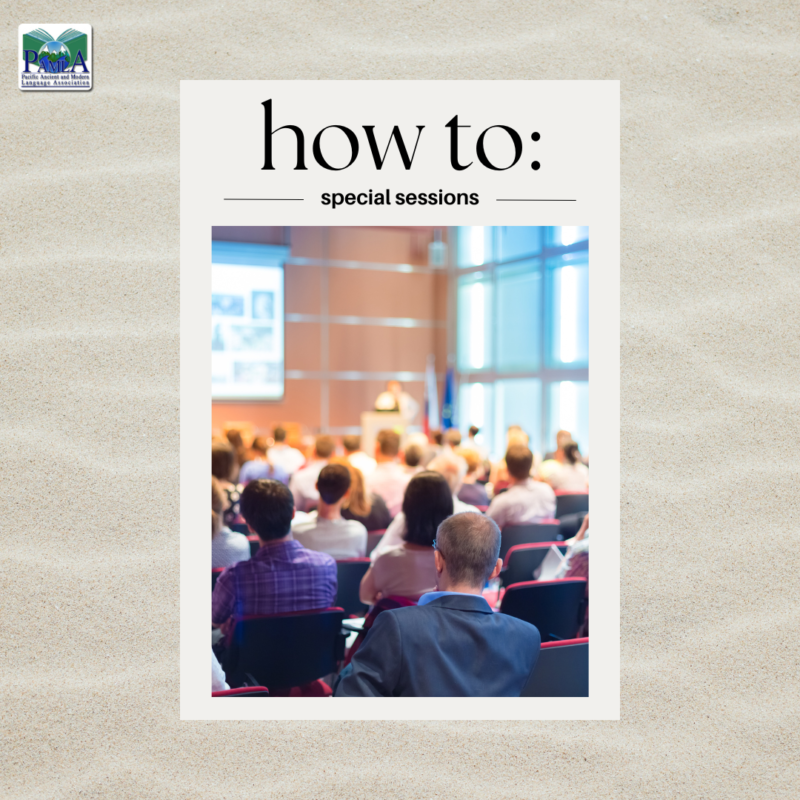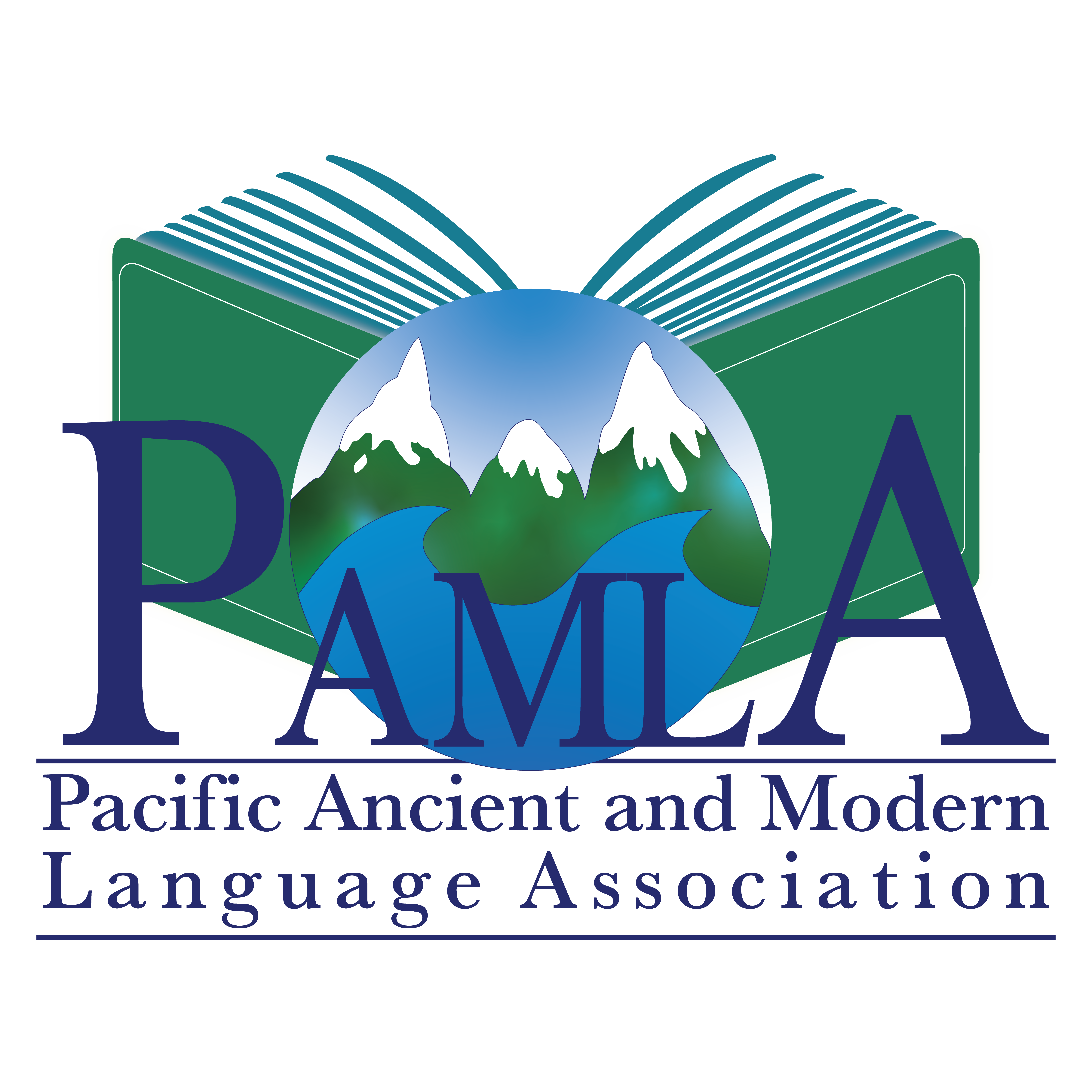
PAMLA welcomes special session proposals for the 2024 PAMLA conference in Palm Springs, California on topics of scholarly, literary, filmic, or cultural interest. The deadline for special session proposals (including for panels, creative events, workshops, poster sessions, etc.) is coming up at the end of March (but please try to propose your special session as soon as possible). To submit, log into pamla.ballastacademic.com (you will need to create an account there, if you have never done so) and then click on the Propose Session button, and follow the directions from there.
Special session and paper submissions are not limited to the theme of this year’s conference, “Translation in Action.” But if you’d like to touch on the theme that would be most welcome.
Should your proposal be accepted, you will become the presiding officer for the session.
As presiding officer, it will be your duty to: stay in email contact with potential panelists and the PAMLA leadership team (Executive Director, Information Director, Communications Director, etc.); help to publicize your session via emails to possible panelists and through CFP postings; select panelists from the proposals; contact the Executive Director immediately should any problems or questions arise; prepare your panelists for your session and the conference, remaining in email contact with them (and letting them know how much time they will have, etc.); chair the session (including making sure that a thoughtful and vibrant discussion takes place following the presentations; following the conference, inform Sonia Christensen ([email protected]) of how many people attended your session and of any panelists who canceled or didn’t show up.
The CFP list of approved sessions and portal for proposing papers to one of our approved sessions is now open and will remain open until April 30, 2024. More new, approved sessions will be added to the CFP list almost every day for the next few weeks, so keep checking back.
You may submit a proposal for a special session now: https://pamla.ballastacademic.com/
Hints for Special Session Proposals:
- To propose a special session you will need to go to https://pamla.ballastacademic.com/ and log in there (create an account there if you don’t already have one). Then, click on the Propose Session tab, and follow the directions from there.
- We welcome special session proposals on a wide variety of topics; we are particularly interested in special session proposals that engage with the 2024 PAMLA Conference Theme: Translation in Action.
- We are also interested in special session proposals on broad topics different from the topics of our general (standing) sessions (see below to find a list of PAMLA’s general/standing sessions).
- PAMLA also encourages special session proposals with alternative formats, such as roundtables, workshops, creative conversations, etc.
- PAMLA encourages session proposals that will welcome paper proposals from a wide variety of scholars, not just scholars from the presiding officer’s host institution.
- To propose a special session, you will need a proposed title, the session format (panel, roundtable, workshop, creative event, etc.), primary and perhaps secondary subject area (American, Italian, Cultural Studies, etc.), a brief abstract of 50-150 words written for both potential panelists and audience members, and a longer proposal (200 to 400 words) that includes a description of the theme or topic, as well as some discussion of the session’s significance and perhaps some topics of particular interest.
- It is important to think about the scope of your special session proposal. On the one hand, topics that are too narrow are unlikely to receive enough strong proposals. On the other hand, you don’t generally want to have a session that is too broad, unless it is a possible new subject area for our PAMLA conference (see below for a list of our broad General/Standing sessions).
- We are interested in special session proposals broad enough to perhaps become general (standing) sessions after three successful years as special sessions (with the PAMLA board’s approval).
- We are also interested in proposals for sessions from allied associations (such as Women in French, ASLE, MELUS, etc.). For allied association status, please email Executive Director Craig Svonkin.
If you have any questions, please contact PAMLA Executive Director Craig Svonkin ([email protected]) or PAMLA Vice President Peter Schulman ([email protected]).
*PAMLA hosts the following General/Standing Sessions (So please make sure that your special session proposal does not merely replicate the topic of one of these existing General/Standing Sessions):
21st-Century Literature; Adaptation Studies; African American Literature; American Literature before 1865; American Literature 1865-1945; American Literature after 1945; Ancient-Modern Relations; Anime and Manga; Architecture, Space, and Literature; Asian American Literature; Asian Literature; Austrian Studies; Autobiography; Bible and Literature; British Literature and Culture: To 1700; British Literature and Culture: The Long Eighteenth Century; British Literature and Culture: The Long Nineteenth Century; British Literature and Culture: 20th and 21st Century; Carceral/Prison Studies; Children’s Literature; Classics (Greek); Classics (Latin); Coalitional Feminisms; Comics and Graphic Narratives; Comparative American Ethnic Literature; Comparative Literature; Comparative Media; Composition and Rhetoric; Creative Writing; Critical Theory; Cultural History; Digital Studies; Disability Studies; Disney and Its Worlds; Drama and Society; East-West Literary Relations; Film and Literature; Film Studies; Folklore and Mythology; Food Studies; French; Gay, Lesbian and Transgender Literature; Germanic Studies; Gothic; Hip Hop Poetics; Indigenous Literatures and Cultures; Italian; Italian Cinema; Italian Ecocriticism; Jewish Literature and Culture; Latina/o Literature and Culture; Linguistics; Literature & the Other Arts; Literature and Religion; Medieval Literature; Middle English Literature, including Chaucer; New Italians; Oceanic Literatures and Cultures; Old English Literature, including Beowulf; Poetry and Poetics; Post-Colonial Literature; Religion in American Literature; Rhetorical Approaches to Literature; Romanticism; Science Fiction; Shakespeare and Related Topics; Spain, Portugal, and Latin America: Jewish Culture & Literature in Trans-Iberia, Spanish and Portuguese (Latin American); Spanish and Portuguese (Peninsular); Teaching with Media and Technology; Teaching Writing Across the Disciplines; Television Studies; Travel and Literature; Veterans Studies; Video Game Studies; Western American Literature; Women in Literature; Young Adult Literature and Culture.
